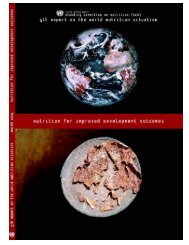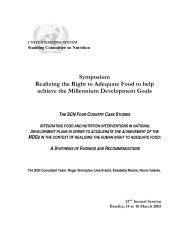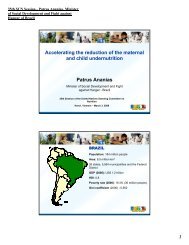Universal Salt Iodization (USI) - FTP Directory Listing
Universal Salt Iodization (USI) - FTP Directory Listing
Universal Salt Iodization (USI) - FTP Directory Listing
- No tags were found...
Create successful ePaper yourself
Turn your PDF publications into a flip-book with our unique Google optimized e-Paper software.
20FEATURESwww.unsystem.org/scnThere must be visible and regular political commitment to the protection of young brains from permanentdamage. If it is the right of the people to be protected from preventable brain damage, then it is the obligationof political leaders to help assure that right. This must be manifested through national political executiveleaders, through legislative leaders and the transparent application of laws and regulations, and by judicialassurance that laws will be enforced and quality products protected in the marketplace.An annual advocacy plan must ensure that political commitments are renewed and not allowed to fade likethe morning mist. Advocacy is not an event, but a process, and a permanent need. It must address the policymakers, the producers and processors as well as the public simultaneously, but in different ways using allchannels available and all modern techniques. It is advocacy of the need for iodine which will sustainelimination of the deficiency, not mere pronouncements from afar.Education and learning systems need to become the channels through which generational commitment tosustain adequate daily requirements of iodine are seen as the norm. The dangers of iodine absence and thevalues of its presence in the diet are essential learning needs. A ‘one off’ annual function for IDD Day, asvaluable as it is, does not successfully transmit knowledge and information through the curriculum. Inaddition, it is important to address the issue of iodine nutrition for animals. Therefore the agriculture sectorplays a key role in sustained elimination by creating demand for the product, by improving the quality andproductivity of domestic animals and by assuring sustainable access to iodine.Successful advocacy planning has been a major factor in the unfolding success stories of <strong>USI</strong> achievementand IDD sustained elimination in China, Iran, Kenya, Malawi, Nigeria, Zambia, Zimbabwe, and most of thecountries of Spanish speaking America to name a few. The Government and industry in China, with thesupport and collaboration of international agencies, has committed to annual ‘re advocacy’ activities to assurecontinued political commitment, assured sustained quality production, sustained oversight at provincial levels,and public education.It is vital to assure that the national scientific community continue to seek new knowledge, but equallyimportant to demand the more rapid application of this knowledge.Key elements of an advocacy planAn annual advocacy plan to address iodine deficiency should be designed to sustain political commitment toprevention of preventable brain damage. The Advocacy Plan must sustain high level commitment andleadership in the private sector (salt producers and food processors mostly), the public sector (regulatory andmonitoring/ reporting officials) and the public (which needs to know the values of iodine in the diet and thedangers of its absence and to demand services to sustain elimination of the deficiency). An advocacy plan foriodine nutrition should seek to:▪ Obtain and sustain political commitment nationally;▪ Sustain knowledge and information about the values of iodine in the diet and the dangers of its absence;▪ Press for clear understanding that every child has the right to reach its genetic potential; that it is wrong toallow children to be born mentally handicapped when we know how to prevent this.▪ Use modern information, communication channels, and technology with imagination and flair, and withclear communications for those addressed;▪ Implant the concept that good nutrition is good politics and that sustained <strong>USI</strong> and Elimination of IDD arenot sectoral issues, but national issues; that <strong>USI</strong> and elimination of IDD absolutely depend upon thesuccessful and efficient collaboration between private business entities, public policy leaders, scientific andacademic knowledge centres, and the public.Development Agencies and line Ministries need to sustain media commitment and attention through nationalinvestigative reporting. This is essential to sustain public knowledge, government commitment and producersupport. National scientific, cultural, religious and civic media, along with daily press, radio, television and thegrowing access to cellular communications should be fully tapped.SCN NEWS # 35 back to contents







